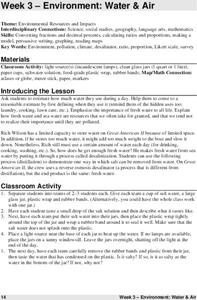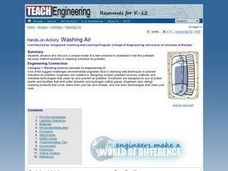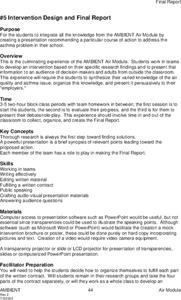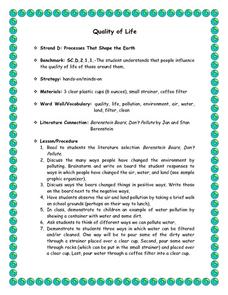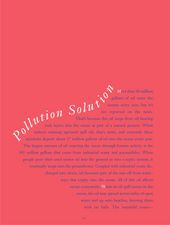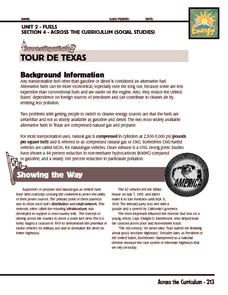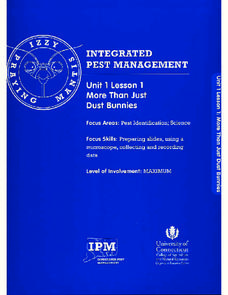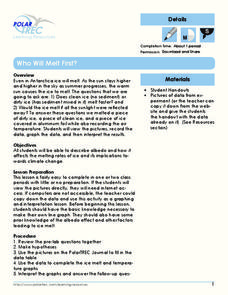Curated OER
The Awful Eight
Middle schoolers investigate the concept of a carpool and its contributions to either reducing or increasing air pollution. They conduct research using a variety of resources for background information. The information is used to write a...
Curated OER
For Your Eyes Only
Students identify two major types of visible pollutants, smog, and particulate matter, They explain that air pollutants are generated during incomplete combustion. They measure and rank collectors from the most pollutants to the least...
Curated OER
Air Quality Trivia Time
Middle schoolers identify and analyze what the Air Quality Index (AQI) is and how it works. They review ways that "unhealthy" or "hazardous" days could be prevented and draw and color something that they can do to help reduce air...
Curated OER
Keep the Environment Clean
Students discuss ways our environment becomes polluted. They make a list of ways to keep it clean.
Curated OER
Is Dry Cleaning Dangerous?
In this dry cleaning worksheet, students read about the chemicals used to clean clothes and the alternative possibilities for dry cleaning use. Students answer three critical thinking questions about the dangers of the chemical agents...
Curated OER
Auto-Mania
In this history of automobiles worksheet, learners answer 20 questions about the automobile industry, the changes that have taken place over the course of the auto industry's history and the current statistics about automobiles.
Curated OER
Clean, Green Power
Students explore and discuss alternative energy sources, and identify disadvantages of current fossil fuels.
Curated OER
Environment: Water & Air
The introduction to the lesson mentions a sailor's limited capacity to store drinking water on his ship. Pupils then set up an overnight experiment to remove freshwater from salt water by distillation. There is a math and map activity to...
Curated OER
Washing Air
Learners observe a model of a wet scrubber. They discuss this and other methods of pollutant recovery. They discover how engineers use this information to protect the environment.
American Chemical Society
Changing State: Freezing
There are five types of frost: ground frost, air frost, hoar frost, glaze, and rime. Scholars mix ice and salt in a metal container to observe frost forming on the outside of the can. Animations and videos enhance the learning.
Curated OER
Flying High With Hot Air Balloons!
Sixth graders demonstrate an understanding of a narrative story by listening, speaking, reading and writing activities. They create two visual products that reflect the understanding of events, vocabulary, and characters.
Curated OER
Intervention Design and Final Report
Students engage in series of studies having to do with the Ambient Air Module. They create a presentation to recommend a solution for the asthma problem experienced by students at school. The rubric is found at the end of the lesson and...
Curated OER
Quality of Life
Learners discover that people influence the quality of life of those around them. They read the literature selection 'Berenstein Bears, Don't Pollute' and discuss the many ways people have changed the environment by polluting.
Curated OER
Let's Heat Things Up!
Young scholars build and evaluate simple models to understand the greenhouse effect. They explore the role of increased greenhouse gas concentration in global warming, and the implications of global warming theory for engineers,...
Curated OER
Recycling
Third graders observe the importance of recycling. For this environmental lesson, 3rd graders will view experiments on water filtration, paper-making, and breathing pollutants, and will categorize recyclable materials.
Curated OER
Pollution Solution!
Young scholars listen to the story "Clean Air, Dirty Air" by Lynne Patchett and discover the main types of pollution and how these affect their bodies. In this pollution lesson, students work in small groups to create a machine to...
Curated OER
How Green Are We?
Students identify and interpret the importance of energy efficiency in connection with air pollution. They communicate with families and peers about ways to more effectively contribute to the reduction of air pollution. Finally,...
Texas State Energy Conservation Office
Investigation: Tour de Texas
Teams of Texas tourists gather into groups to analyze what they can do with $50 worth of an alternative fuel. They write checks, keep a balance sheet, and map out their sight-seeing route taking into consideration the location of...
Serendip
Photosynthesis Investigation
Can scientists increase the rate of photosynthesis to help clean the air? Scholars complete an experiment determining net photosynthesis. Then, they apply knowledge from the activity to design their own investigations of the factors that...
University of Connecticut
More Than Just Dust Bunnies
Teenagers will never complain about cleaning their rooms after this activity. In the first lesson of a four-part series, budding scientists collect samples of dust, chalk, and other particulates from various areas of the classroom. They...
Polar Trec
Who Will Melt First?
If the Greenland ice sheet melted, sea levels would rise by about 20 ft; if the Antarctic ice sheet melted, sea levels would rise by 200 ft. Scholars explore ice melting through the analysis of different ice samples, clean and dirty ice....
Nuffield Foundation
Investigating Enzymes Used in Laundry Detergent
It's a win-win situation: learn about enzymes and get clean clothes, too. Young scientists add enzymes to a dilution of laundry detergent. They apply them to stained fabrics to determine the effectiveness of the enzyme-filled detergents.
US Environmental Protection Agency
Water Purification by Evaporation and Condensation
This easy-to-perform demonstration shows students how the water cycle, specifically the processes of condensation and evaporation, purifies Earth's water supply. Just mix up some water, dirt, and gravel in a glass bowl, place a cup in...
Curated OER
Making a Surface Coating
Students prepare a nonaqueous surface coating by first making a polymeric resin and then adding an organic solvent. There product is a basic varnish that hardens by loss of organic solvent to the air. Students make a simple paint by...
Other popular searches
- Clean Air Act
- Clean Air Quality
- Clean Air First Grade
- Plants Help Clean Air
- Clean Air and Water
- Clean Air Act of 1970
- Clean Air Activity
- Recipe for Clean Air
- Houseplants Clean Air
- Clean Air Activity Ad
- Clean Air Challenge Quiz
- We Need Clean Air









